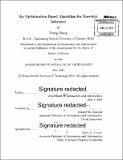An optimization based algorithm for Bayesian inference
Author(s)
Wang, Zheng, S.M. Massachusetts Institute of Technology
DownloadFull printable version (8.127Mb)
Alternative title
Optimization-based sampling algorithm for Bayesian inference
Other Contributors
Massachusetts Institute of Technology. Department of Aeronautics and Astronautics.
Advisor
Youssef M. Marzouk.
Terms of use
Metadata
Show full item recordAbstract
In the Bayesian statistical paradigm, uncertainty in the parameters of a physical system is characterized by a probability distribution. Information from observations is incorporated by updating this distribution from prior to posterior. Quantities of interest, such as credible regions, event probabilities, and other expectations can then be obtained from the posterior distribution. One major task in Bayesian inference is then to characterize the posterior distribution, for example, through sampling. Markov chain Monte Carlo (MCMC) algorithms are often used to sample from posterior distributions using only unnormalized evaluations of the posterior density. However, high dimensional Bayesian inference problems are challenging for MCMC-type sampling algorithms, because accurate proposal distributions are needed in order for the sampling to be efficient. One method to obtain efficient proposal samples is an optimization-based algorithm titled 'Randomize-then-Optimize' (RTO). We build upon RTO by developing a new geometric interpretation that describes the samples as projections of Gaussian-distributed points, in the joint data and parameter space, onto a nonlinear manifold defined by the forward model. This interpretation reveals generalizations of RTO that can be used. We use this interpretation to draw connections between RTO and two other sampling techniques, transport map based MCMC and implicit sampling. In addition, we motivate and propose an adaptive version of RTO designed to be more robust and efficient. Finally, we introduce a variable transformation to apply RTO to problems with non-Gaussian priors, such as Bayesian inverse problems with Li-type priors. We demonstrate several orders of magnitude in computational savings from this strategy on a high-dimensional inverse problem.
Description
Thesis: S.M., Massachusetts Institute of Technology, Department of Aeronautics and Astronautics, 2015. Cataloged from PDF version of thesis. Includes bibliographical references (pages 75-76).
Date issued
2015Department
Massachusetts Institute of Technology. Department of Aeronautics and AstronauticsPublisher
Massachusetts Institute of Technology
Keywords
Aeronautics and Astronautics.